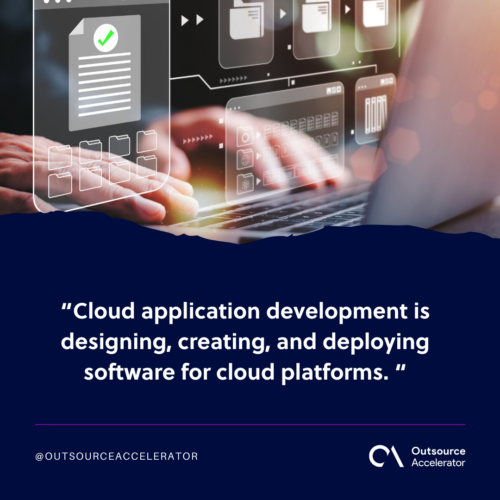An introduction to cloud application development

The cloud looms as a transformative force of rapid technological advancement.
Cloud application development reshapes how software is conceived, constructed, and delivered. The convergence of cloud computing and application development has revolutionized software creation and business operations.
As industries migrate to the cloud, the expertise of skilled developers becomes indispensable. These professionals bridge the gap between cutting-edge technology and real-world business needs.
This article examines the nature of cloud application development and what developers can do for you.
What is cloud application development?
Cloud application development is designing, creating, and deploying software for cloud platforms. Cloud application developers utilize cloud tools, storage, and infrastructure.
Cloud application developers leverage cloud computing models to create, host, and manage applications. These models abstract the underlying complexities of hardware provisioning, maintenance, and scaling.

Key characteristics of cloud application development include the use of the following:
- Microservices architecture
- Containers
- Serverless computing
- Continuous integration and continuous deployment (CI/CD) practices
These methodologies enable the creation of modular, responsive, and easily maintainable applications that can scale seamlessly to accommodate user demand.
Outsourced, a firm experienced with hiring web development roles, is among the go-to partners of businesses looking to hire remote cloud application developers.
Cloud application models
Cloud computing offers different application models that cater to various business needs.
These models offer different levels of abstraction and management, allowing users to choose the model that best suits their needs. All provide scalability, cost-effectiveness, and flexibility.
Here are the three most common cloud application models:
SaaS
Software as a Service (SaaS) is a cloud application model where software applications are delivered over the internet as a service.
Users access and use the software through a web browser without installing or managing any additional infrastructure or applications.
PaaS
Platform as a Service (PaaS) allows developers to build, deploy, and manage applications.
Through PaaS, they don’t need to worry about any underlying infrastructure. The cloud service provider handles all components, including servers, storage, and networking.
Cloud application developers can focus on refining and deploying their applications.
IaaS
Infrastructure as a Service (IaaS) supplies virtualized computing resources over the internet. This allows users to rent and manage virtual machines, storage, and networking infrastructure.
With IaaS, users have more control over the underlying infrastructure. This allows them to install and manage their operating systems, middleware, and applications.
Benefits of cloud application development
Cloud application development has changed how we create and utilize software. Leveraging cloud technologies offers many advantages that empower businesses to innovate, scale, and streamline their operations.
Here are the leading benefits of cloud application development:
- Scalability and flexibility. The elasticity of cloud applications allows businesses to handle varying traffic levels without significant infrastructure changes.
- Cost efficiency. Cloud application development reduces the need to invest in and maintain on-premise hardware. With pay-as-you-go pricing models, you only pay for the resources you use.
- Rapid deployment. Cloud developers can employ pre-configured environments, development frameworks, and deployment automation to speed up the development cycle. This translates to quicker time-to-market.
- Accessibility and collaboration. Cloud applications can be accessed from anywhere with an Internet connection. This enables developers to work collaboratively.
- Reliability and availability. Built-in failover mechanisms and disaster recovery options ensure that your cloud applications remain available in the face of hardware failures or other disruptions.
- Security enhancements. Cloud application development benefits from robust security features like data encryption, firewall protection, and multi-factor authentication.

- Automatic updates and maintenance. Cloud platforms manage updates, patches, and maintenance tasks, freeing developers from the burden of manual support.
- Innovation and experimentation. Cloud application development provides an ideal environment for experimentation and innovation. Developers can prototype and test new ideas easily.
- Integration capabilities. Cloud platforms offer a wide array of APIs and integration tools that facilitate seamless integration with other systems.
- Global reach and localization. Cloud applications enable businesses to reach a global audience. Furthermore, cloud platforms often provide content delivery networks (CDNs) to optimize content delivery and ensure optimal performance for users.
Outsource a cloud application developer
The decision to outsource a cloud application developer depends on several factors, including project requirements, budget, and the availability of in-house resources.
Outsourcing can offer several benefits, such as access to specialized expertise, cost savings, and faster time-to-market.
However, it’s important to note that outsourcing is not a one-size-fits-all solution. If you think outsourcing is appropriate for your company, it’s best to take steps to mitigate risks, such as by seeking experienced partner firms.
Partner with Outsourced to hire from the top percent of web developers in the Philippines.
Outsourced is a leading outsourcing company that provides full-time remote staff offshoring services. Build an offshore web development team to master all aspects of cloud management.
Contact Outsourced today to get started.







 Independent
Independent




